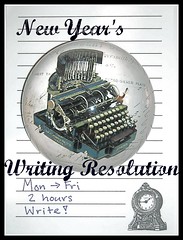
I've never been big on New Year's resolutions, but this year I'm taking the opportunity to goal set and start up a writing routine. No more excuses. If I want to call myself a writer, then I need to write! (And regularly, not just when the mood strikes me.)
Between now and April is the most free time I will get all year. No grad classes. No reading lists to get ahead on. Just me and my time. I've already said that I relish this time of year because I get to read what I want to read, but this year, I'm setting a goal to start and complete a first draft of a new novel...by April 1st. (April is when I get started on my reading list for summer, hence the April 1st deadline.)
It's no NaNo (writing 50,000 words in a single month), but considering there's some research that needs to be done, I think 3 months is a tough but realistic time frame.
Now here's where I had to do some troubleshooting. I wanted to set up a specific time of day where I could productively write. I've struggled with this in the past. I get out of school around 3pm each day. And while afternoons would be the preferred time to write because I'm not dragging tired yet... it's not realistic considering after school I could have meetings, parent conferences, errands, etc. So 3-5pm is out.
And 8pm is prime TV hour. So 8-9pm is out of the picture. And then to be totally honest, any time after that I'm too tired to be productive. And I need to start winding down around that time or else I suffer from insomnia.
So, I've decided prime writing time is going to be after fixing dinner, while drinking tea, from 6-8pm. My goal will be 500-1000 words per day which will place me at perfect first draft range of 45,000-90,000 words over a 3 month time frame.
So if anyone would like to join me in gluing their butt to their chair from 6-8pm every night and cranking out some words. Let me know. We can exchange word counts or something.
Here's to a new year filled with the click clacking of freshly typed words!
